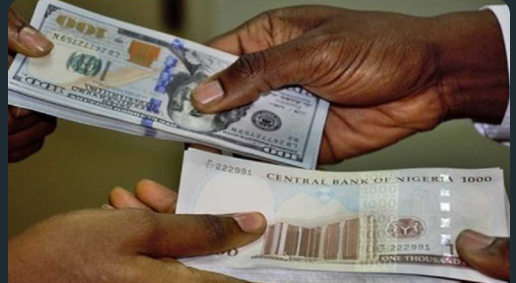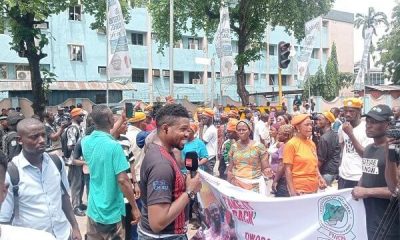Economy
SIM-NIN linkage: Blocked lines rise to 40 million
No fewer than 40 million telephone lines were barred by telecommunication operators over the weekend following the expiration of the February 28, 2024 deadline issued by the Nigerian Communications Commission mandating telecom consumers to link the Subscriber Identity Module to their National Identity Numbers.
This represents a 28 million increase from the 12 million telephone lines initially planned to be deactivated by telcos, following the NCC directive.
In a December 2023 notice, the NCC had asked telcos to bar SIMs that had not been linked to their owners’ NINs by February 28, 2024.
On Thursday, the NCC Director of Public Affairs, Reuben Mouka, ruled out an extension of the deadline, warning that telcos that failed to enforce the deadline would be sanctioned.
The Chairman of the Association of Licensed Telecommunications Operators of Nigeria, Gbenga Adebayo, then disclosed to The PUNCH telcos would bar 12 million lines as a result of the directive.
However, on Sunday, the ALTON chair revealed that the number of barred lines had risen to 40 million, pointing out that SIMs without NIN were included in the number.
In an exclusive interview with The PUNCH, Adebayo said, “I can tell you that over 40 million lines have been blocked and the affected customers are those who didn’t submit their NIN at all. Some persons have not presented any NIN to operators. They haven’t registered their SIMs or participated in the harmonisation programme.
They simply haven’t made any presentation of the NIN number to their operators and those were the persons blocked. So why is the number so alarming despite repeated warnings? It shows many people still communicate but are not registered.”
In the December 2023 notice, the NCC had also asked the Global Satellite Mobile Communications operators to bar SIMs holders whose NINs have been submitted but not verified by March 29, 2024; and interdict those who have less than five lines linked to an unverified NIN by April 15, 2024.
The Federal Government had, on December 16, 2020, introduced the SIM-NIN synchronisation initiative meant to enable security agencies to track criminals.
The synchronisation involves validating the NIN with the National Identity Management Commission and matching the subscriber’s NIN records with the SIM registration information (verification) to ensure proper subscriber identification.
However, Nigerians have raised questions on why security agencies have not used the SIM-NIN linkage to track criminals, especially bandits and kidnappers, who often use mobile telephone lines to speak with victims’ families during ransom negotiations.
Presently, there are 224.7 million active mobile telephone lines in the country, according to the information released by the NCC on its website.
On Sunday, the ALTON chairman did not give the breakdown of subscribers or SIMs that were deactivated by telcos over the weekend.
He said, “No, we currently don’t have the breakdown of disconnected lines per network right now but I know over 40 million lines have been deactivated.”
Adebayo further hinted that another series of disconnections would be implemented by the end of the month and mid April.
Adebayo said, “The second tier of disconnections that will happen are those who have provided NIN but have more than five Mobile Subscription Identification Numbers associated with their NIN, and these have not been verified.
This is because some have differences in the order of their names, and some have differences in their date of birth.
The information provided to the operator when they did the SIM registration is different from what they provided (to NIMC) when they did their NIN. Some subscribers also have some differences in other records that are very critical to their verification process.
“So these people who have more than five MSINs attached to their NIN and haven’t been verified will be disconnected effective March 30, 2024. So we may have more disconnections happening by the end of this month.
If somebody has given a name that has not been verified and has been receiving text messages to verify and they haven’t done that, by March 30th, those people will be disconnected and the figures will further increase.”
He explained, “There are two sources of data-primary and secondary. During the first registration process, the customer’s information is on-boarded to a server when everyone did the SIM registration but the secondary record is for details given during NIN. Hence your primary record has to be uniform with the secondary data across the platforms before you can be verified.
“Furthermore, for those who have less than five MSINs, by April 15th, they will be disconnected if they don’t harmonise their records before then. So we are going to go through a series of disconnections or service suspensions over the next two months if people don’t follow the laid down regulations.”
Reacting, the President, National Association of Telecoms Subscribers, Adeolu Ogunbanjo, has said the body will seek redress in court on Thursday if the deadline is not extended.
Adeolu, who confirmed that the number of barred subscribers was above 12 million earlier indicated, asked the NCC to consider the plight of customers and grant a 31-day extension.
In an interview with The PUNCH on Sunday, he said, “We have appealed to the Nigerian Communication Commission to extend the deadline till March 31st. But if this is not done, we will observe the situation for the next three days, that is Monday to Wednesday and if this is not granted, we will have to file a case in court on Thursday.
“We have and still appealing that this deadline be extended. We understand their position concerning security issues but a 31-day extension would not harm anyone and that is why we didn’t ask for three months. The NCC boss should please give us this gift as a resumption gift and not punish subscribers.”
Economy
SEE Black Market Dollar To Naira Exchange Rate In Lagos, FCT, April 7th 2025

The local currency (abokiFx) opened at ₦1,560.00 per $1 at the parallel market, otherwise known as the black market, today, Monday, 7 April 2025, in Lagos, Nigeria, after it closed at ₦1,550.00 per $1 on Sunday, 6 April 2025.
Black market dollar to naira exchange rate today, 7 April 2025, also known as Aboki forex, can be accessed below.
NOTE: The exchange rate changes hourly. It depends on the volume of dollars available and the Demand. What this means is that…you can buy or sell 1 dollar at a certain rate and the price can change (high or low) within hours.
The official naira black market exchange rate in Nigeria today, including the Black Market rates, Bureau De Change (BDC), and CBN rates. Please note that the exchange rate is subject to hourly fluctuations influenced by the supply and demand of dollars in the market. As of now, you can purchase 1 dollar at a certain rate now however, it’s important to remember that the rate can shift (either upwards or downwards) within hours.
Economy
Crude prices slump to $65 first time since 2021

Oil prices plunged this week to $65 per barrel as the United States import tariffs and an unexpected OPEC+ supply hike erased $10 per barrel from global benchmarks.
The price appreciated last week when US President Donald Trump imposed tariffs on any country that buys crude from Venezuela.
However, oil prices turned around the corner as of Friday, with Brent falling to $65, the first time since 2021.
According to oilprice.com, the combined effect of Trump’s import tariffs, OPEC+’s inopportune decision to speed up the unwinding of production cuts, and China’s retaliatory actions wiped off $10 per barrel from global oil prices, “with ICE Brent falling below $65 per barrel for the first time since August 2021.”
The US West Texas Intermediate crude futures lost $4.96, or 7.4 per cent to end at $61.99.
“Seeing backwardation barely change compared to the beginning of the week, one could assume that US tariffs are the defining factor for the price change. Nevertheless, this week will not go down well in the history of oil markets,” oilprice.com reports.
China’s retaliatory tariffs on US goods have escalated a trade war that has led investors to price in a higher probability of recession.
China, the world’s top oil importer, announced it will impose additional tariffs of 34 per cent on all US goods from April 10.
According to Reuters, nations around the world have readied retaliation after Trump raised tariffs to their highest in more than a century.
Aside from the tariffs, another factor that further pressured oil prices was the Organisation of the Petroleum Exporting Countries and Allies’ decision to advance plans for output increases.
The group now aims to return 411,000 barrels per day to the market in May, up from the previously planned 135,000 bpd.
Economy
CBN allocates $197.71m into FX market to support naira

The Central Bank of Nigeria has injected $197.71m into the foreign exchange market on Friday, April 4, 2025, as part of its commitment to ensuring adequate liquidity and maintaining orderly market functioning.
This was disclosed in a statement on Saturday by the Director of the Financial Markets Department, Dr Omolara Omotunde-Duke, reiterating the bank’s stance on maintaining market integrity and operational transparency.
The statement read, “In line with its commitment to ensuring adequate liquidity and supporting orderly market functioning, the CBN facilitated market activity on Friday, April 4, 2025, with the provision of $197.71m through sales to authorised dealers. This measured step aligns with the bank’s broader objective of fostering a stable, transparent, and efficient foreign exchange market.”
The CBN said the intervention was in line with its broader objective of fostering a stable, transparent, and efficient foreign exchange market.
It added that it remained focused on sustaining liquidity levels to support smooth market operations amid ongoing global economic adjustments.
The apex bank said the decision to boost liquidity in the FX market came against the backdrop of significant shifts in the global macroeconomic landscape, which had affected many emerging markets and developing economies, including Nigeria.
It noted that the recent introduction of new import tariffs by the United States on goods from several economies had triggered adjustments across global markets.
It added that crude oil prices—a major revenue source for Nigeria—had dropped by over 12 per cent, settling at approximately $65.50 per barrel.
The CBN said the downturn posed challenges for oil-exporting countries, influencing exchange rate dynamics and market sentiment.
The CBN stressed that it would continue to monitor both global and domestic market conditions. It expressed confidence in the resilience of Nigeria’s foreign exchange framework, which it said was designed to adjust appropriately to changing economic fundamentals.
The bank also urged all authorised dealers to strictly adhere to the principles outlined in the Nigerian FX Market Code, promoting transparency and upholding the highest standards in their transactions with clients and market counterparties.
Meanwhile, Nigeria’s official exchange rate fell to N1,600/$1 at the end of trading on April 4, 2025, as the tariffs imposed during the Trump era continued to impact global markets.
Data from the CBN showed that the naira closed at N1,600/$1, marking a 1.9 per cent depreciation compared to the N1,569/$1 recorded the previous day.
The figure also marked the weakest level the naira had reached since December 4, 2024, when it closed at N1,608/$1. The exchange rate has now weakened by 3.9 per cent in the first four days of April, after closing March at N1,537/$1.
According to the CBN, the exchange rate closed at N1,600/$1 on Friday, marking a 1.9 per cent drop from the previous day.
The intra-day highs and lows were reported as N1,625 and N1,519 to the dollar, respectively. The intra-day high of N1,625 is also one of the highest levels recorded this year, indicating that traders priced the naira at significantly weaker levels.
Conversely, the intra-day low of N1,519/$1 suggests that some traders still priced the naira stronger, possibly betting on short-term interventions.
The NFEM rate, which represents the average exchange rate, closed at N1,567, the weakest the naira has traded this year and since December 4, 2024.
-

 News20 hours ago
News20 hours agoAPC opens up over alleged rift between Tinubu and his deputy, Shettima
-

 News15 hours ago
News15 hours agoJust in: Presidency Insists INEC Chairman, Yakubu Not Sacked
-

 News20 hours ago
News20 hours agoVeteran comedian opens can of worms, says I ‘ve caught many of my friends wives flirting with big men, govs
-

 News16 hours ago
News16 hours agoJUST IN: Police Nab leaders of April 7 nationwide protest
-

 News20 hours ago
News20 hours agoIn Burkina Faso we’re not in a democracy, but in a revolution, No Country develops in democracy” ~ Captain Ibrahim Traore.
-

 News15 hours ago
News15 hours agoJust in: Saudi Arabia Suspends Visa Issuance to Nigeria, 13 Other Countries
-

 Economy20 hours ago
Economy20 hours agoSEE Black Market Dollar To Naira Exchange Rate In Lagos, FCT, April 7th 2025
-

 News15 hours ago
News15 hours agoFG Orders NYSC To Stop Early Morning Drills For Corps Members





